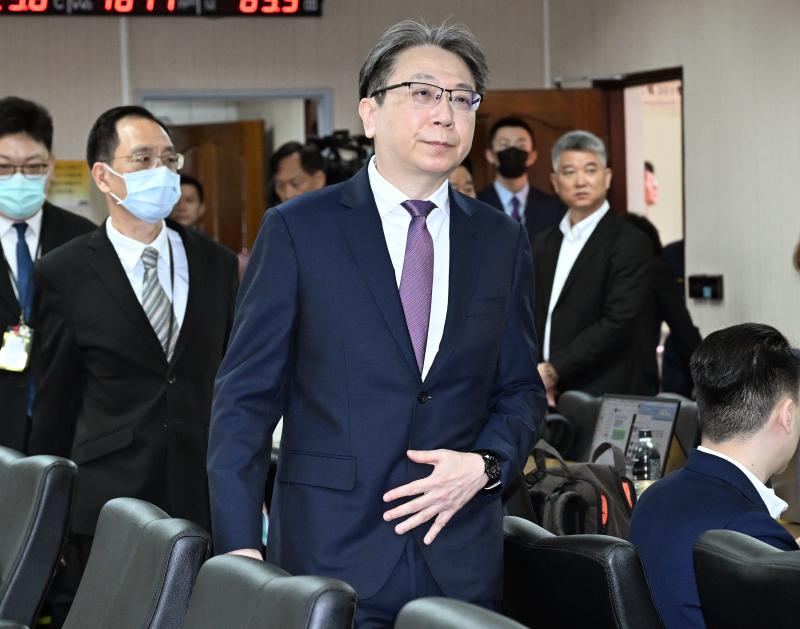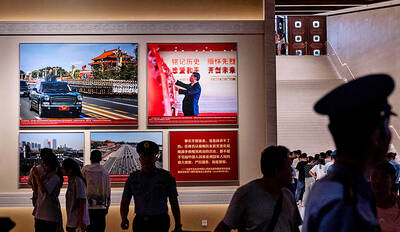Taiwan hopes that it can come to a quick agreement with the US to resolve the tariff issue, and last weekend already approached Washington to discuss the issue, National Security Bureau Director-General Tsai Ming-yen (蔡明彥) said today.
Taiwan has responded to US President Donald Trump's 32 percent tariff set to take effect today US time with an offer of zero tariffs, more investment in the country and purchases from it, and said it would not retaliate.

Photo: Liao Chen-hui, Taipei Times
Speaking to reporters at the legislature, Tsai said the government's position was not to take retaliatory measures, but to come up with more specific solutions.
President William Lai (賴清德) has instructed officials to initiate "strategic communication" between Taiwan and the US, he said.
"So last weekend, we used channels to talk to the US to reflect our position on Taiwan-US tariff negotiations and some of our proposals," Tsai said, without giving details.
Lai has held many meetings with officials to discuss the detailed response, including how to strengthen investment or procurement in the US, he added.
"I think that through this more comprehensive negotiation preparation, we hope that once the US agrees that Taiwan and the US can have a related negotiation process, the two sides can quickly come to an agreement to promote the progress of the relevant negotiation," he added.
The tariffs have hammered Taiwan's stock market.
The government yesterday evening announced the activation of its stock stabilization fund to restore investor confidence and ensure market stability.
The benchmark stock index was down about 1.5 percent today, after hefty losses in the two previous sessions.

Three batches of banana sauce imported from the Philippines were intercepted at the border after they were found to contain the banned industrial dye Orange G, the Food and Drug Administration (FDA) said yesterday. From today through Sept. 2 next year, all seasoning sauces from the Philippines are to be subject to the FDA’s strictest border inspection, meaning 100 percent testing for illegal dyes before entry is allowed, it said in a statement. Orange G is an industrial coloring agent that is not permitted for food use in Taiwan or internationally, said Cheng Wei-chih (鄭維智), head of the FDA’s Northern Center for

The Chinese military has built landing bridge ships designed to expand its amphibious options for a potential assault on Taiwan, but their combat effectiveness is limited due to their high vulnerability, a defense expert said in an analysis published on Monday. Shen Ming-shih (沈明室), a research fellow at the Institute for National Defense and Security Research, said that the deployment of such vessels as part of the Chinese People’s Liberation Army (PLA) Navy’s East Sea Fleet signals a strong focus on Taiwan. However, the ships are highly vulnerable to precision strikes, which means they could be destroyed before they achieve their intended

About 4.2 million tourist arrivals were recorded in the first half of this year, a 10 percent increase from the same period last year, the Tourism Administration said yesterday. The growth continues to be consistent, with the fourth quarter of this year expected to be the peak in Taiwan, the agency said, adding that it plans to promote Taiwan overseas via partnerships and major events. From January to June, 9.14 million international departures were recorded from Taiwan, an 11 percent increase from the same period last year, with 3.3 million headed for Japan, 1.52 million for China and 832,962 to South Korea,

REWRITING HISTORY: China has been advocating a ‘correct’ interpretation of the victory over Japan that brings the CCP’s contributions to the forefront, an expert said An elderly Chinese war veteran’s shin still bears the mark of a bullet wound he sustained when fighting the Japanese as a teenager, a year before the end of World War II. Eighty years on, Li Jinshui’s scar remains as testimony to the bravery of Chinese troops in a conflict that killed millions of their people. However, the story behind China’s overthrow of the brutal Japanese occupation is deeply contested. Historians broadly agree that credit for victory lies primarily with the Chinese Nationalist Party (KMT)-led Republic of China (ROC) Army. Its leader, Chiang Kai-shek (蔣介石), fled to Taiwan in 1949 after losing a